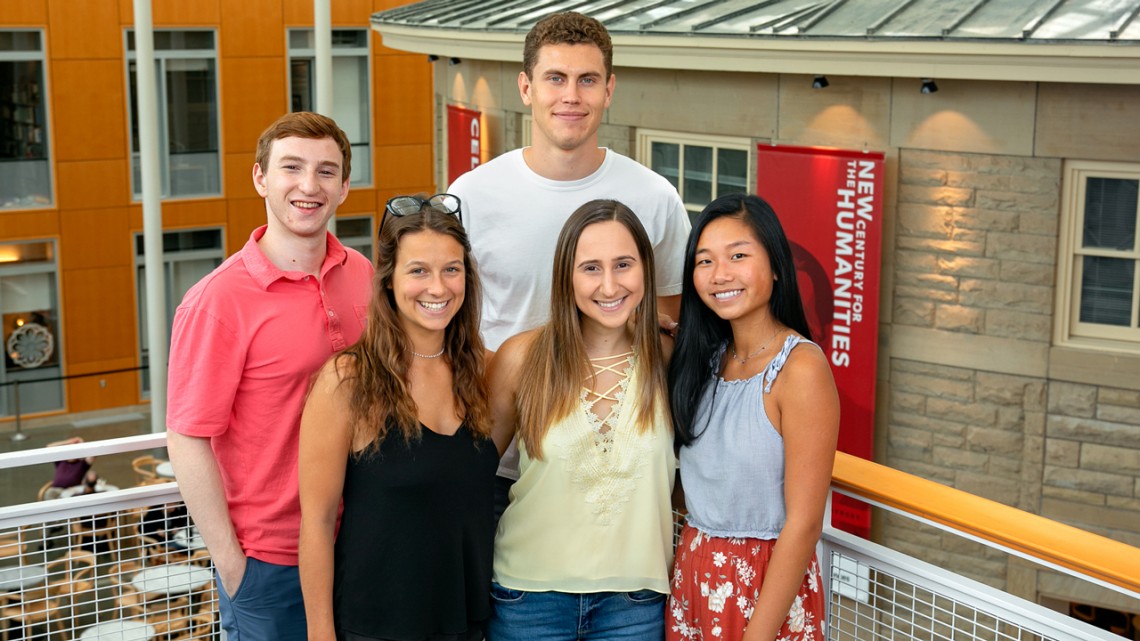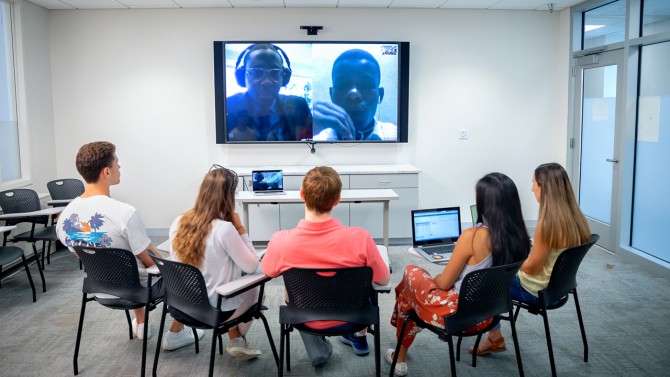
Team members of the student startup Humans to Humans, from left, Josh Londin ’21, founder Clémence Bruguier ’21, Alec Costanza ’21, Elena Pertsalis ’21 and JoJo Cheng ’21. The team was one of nine that stayed in Ithaca to work on their ideas through the Life Changing Labs, in the College of Arts and Sciences.
Incubator helps students advance businesses over summer
By Kathy Hovis
Clémence Bruguier ’21, a government major with a minor in Russian in the College of Arts and Sciences, got a taste of international business as a high school student in her native France, where she started a nonprofit to help improve education for girls in Cambodia.
Her latest venture, Humans to Humans, aims to help entrepreneurs in Ghana by connecting them with Cornell students. Humans to Humans is one of nine student businesses whose leaders stayed in Ithaca this summer to work on their ideas through the Life Changing Labs’ Summer Incubator.
Life Changing Labs is a 501(c)(3) nonprofit that offers numerous resources for Cornell entrepreneurs, with support from the Student Agencies Foundation and Entrepreneurship at Cornell. The eight-week summer incubator program features mentors and speakers who help companies in areas such as key performance indicators, legal, customer discovery and branding.
Most days, participants work independently around campus, but three days a week, they gather at eHub in Collegetown to pitch their businesses and offer each other feedback.
Bruguier’s team also includes Josh Londin ’21, a math and computer science major in the College of Arts and Sciences; Alec Costanza ’21, from the Charles H. Dyson School of Applied Economics and Management, in the College of Agriculture and Life Sciences; Osei Boateng, a master’s student in the Sloan Program in Health Administration; and Elena Pertsalis ’21 and Francisco Wagner ‘21, both operations research in engineering majors in the College of Engineering.
Bruguier’s business connects Cornell students to Ghanaian entrepreneurs who need business assistance in finance, website development, marketing, human resources and other areas.
“This bridges the gap between developed and developing countries,” Bruguier said. “We’re just trying to level out the playing field because where you’re from should not impact your opportunity to succeed.”
Bruguier developed the business idea as a class project in International Humanitarianism, taught by John Weiss, recently retired associate professor of history. Weiss introduced her to a former Ghanaian student and has become a member of her advisory board.
Humans to Humans team members started testing their online platform in early July and hope to finalize it this school year so they can match students with companies next summer. This summer has allowed Bruguier to solidify the members of her team, which she found through the incubator.
“One of the reasons people shy away from startups is the risk,” Wagner said, “but what’s great about the LCL program is that you get all of the benefits of working at a startup – exposure to a business and the way it runs, the ability to develop skills and network with people – you wouldn’t get at a traditional internship.”
Cole Thienes ’19 and his partner, Jack Pertschuck ’19, found space in Rhodes Hall to work on their company, Poloma Analytics, which uses a machine learning algorithm to speed up the due diligence process for drug companies looking to acquire new drugs from smaller companies.
“We can read 70 million pages of information in about 10 minutes and read it like a human would,” said Thienes, who majored in economics and biology in Arts and Sciences and spent last summer working in analytics for an investment management company.
The process of acquiring a new drug from a smaller company or a university research lab often involves lawyers and analysts reading through reams of information kept in a “data room” in the cloud. Their platform can absorb the data and analyze it to find new information, note inconsistencies and compare to find similarities throughout, Thienes said.
“I love talking to people who tell you their story and then hold up a red flag for you, a problem they can’t solve,” he said about being an entrepreneur. “You can dig in and find the root of the problem and then find out exactly how you can solve it.”
See a longer version of this story on the Arts and Sciences website.
Kathy Hovis is a writer for the College of Arts and Sciences.
Media Contact
Get Cornell news delivered right to your inbox.
Subscribe

